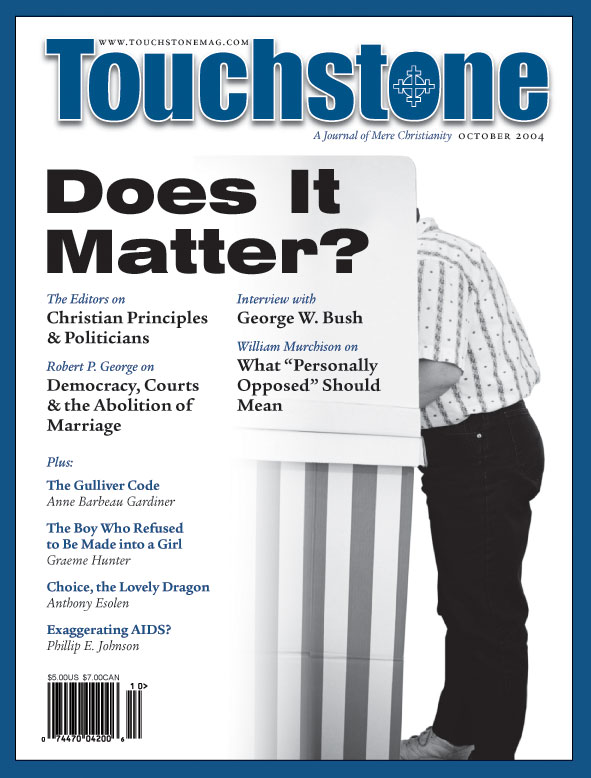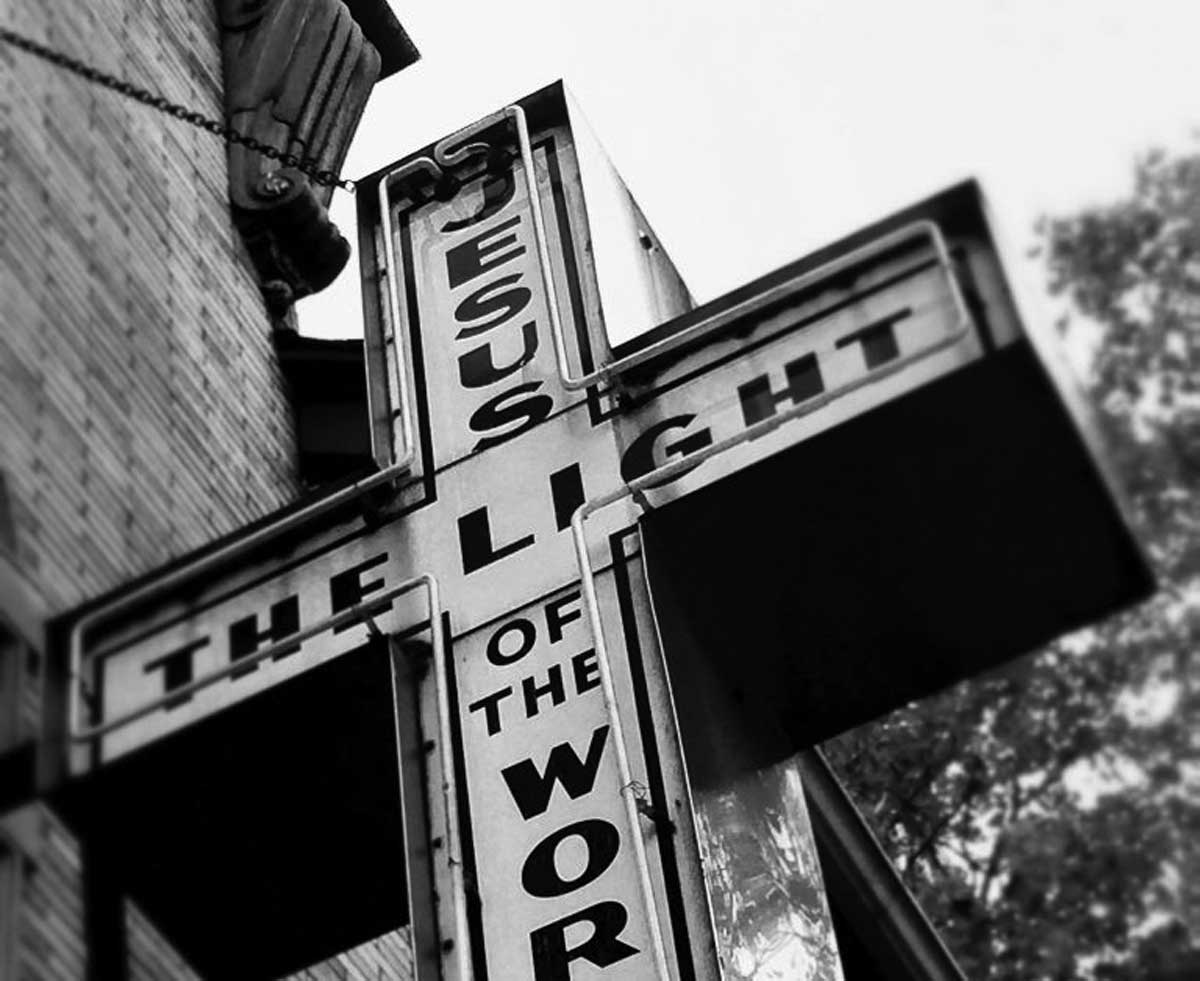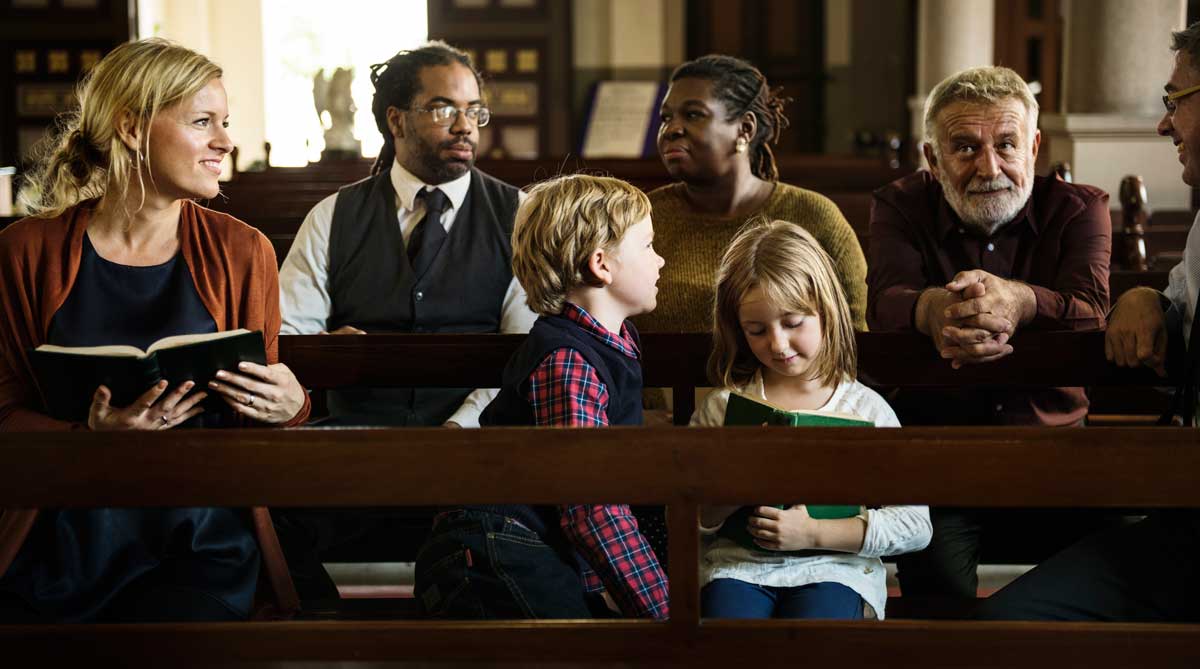Roundtable with a President
by James M. Kushiner
Roundtable participants:
Sheryl Henderson Blunt (Christianity Today)
James V. Heidinger II (Good News)
Deal Hudson (Crisis)
James M. Kushiner (Touchstone)
David L. Mahsman (The Lutheran Witness and Reporter)
Richard J. Neuhaus ( First Things)
Marvin Olasky (World)
Russell Shaw (Catholic writer)
Stephen Strang (Charisma)
Early on the afternoon of May 26, 2004, after passing through a metal detector, sending my portfolio through an x-ray machine, and being wanded twice by a security guard, I entered the White House grounds and was escorted with several others into the foyer of the West Wing. Two days earlier, I and eight other Christian publishers and journalists had been invited to a meeting at the White House with the president.
After 30 minutes, we were invited into the Roosevelt Room, but asked to leave our luggage and bags outside.
War & Questions
Once inside, I admired a Nobel Peace Prize mounted on the wall, given to Theodore Roosevelt in 1906 for his role in brokering peace in the Russo-Japanese War. Teddy the Rough Rider had a reputation as a gung-ho warmonger, but the peace prize balances that out.
And TR certainly came to know the cost of war himself, and not only from his own experiences as a soldier. Losing a son in World War I left him a deeply grieving father, heart-broken and sobered by the death war brings.
After a few minutes, President Bush, our own warmongering president—if you believe the newspapers—arrived on schedule, shook everyone’s hand, and sat down across the table to tell us “a little bit” of what was on his mind. “Obviously Iraq’s on my mind,” he began. (See?)
He spoke about the difficult process of “transferring full sovereignty and freedom” and promoting democracy in Iraq, since “these are people who have lived in tyranny; they haven’t developed the habits of free people yet.” He mentioned his belief in a “clash of ideologies,” and the need to fight terrorists intent on using “the corruption of religion to suit their purposes.”
He then shifted into war rhetoric:
We will use every asset to prevent an enemy from attacking us again. . . . I will not yield to them, to their blackmail, to their murder, to the fear they try to cause through death.
I hoped that President Bush didn’t invite us to the White House to talk mostly about the war. Surely, he wasn’t looking to Christian publishers to back him up in the war in Iraq, was he?
I had come with a bit of skepticism: Why invite Christian editors and publishers? It’s an election year, of course, when candidates angle for votes.
But I hoped for more. I came to the White House primarily as a Christian journalist and publisher, not to get a partisan political story but to hear what the president of the United States might say that would be of interest to our readers.
Orthodox Christians are concerned about the relationship between our government and our religious institutions, as well as in maintaining the freedom we have to practice our religion and speak of our faith in the public square. The editors of this magazine are concerned about the freedom to include our beliefs in public discourse. And paramount are our beliefs about the sanctity of human life and marriage. We had been told that we would each have a chance to ask a question, and I came prepared to ask the president a question about marriage.
On the Home Front
As it turned out, the president did have other things on his mind besides Iraq and the war against terrorism. After those very brief opening remarks, he moved immediately to what I think were his real concerns in speaking to us:
At home, the job of a president is to help cultures change. The culture needs to be changed. I call it changing the culture from one that says, “If it feels good do it” and “If you’ve got a problem, blame somebody else,” to a culture in which each of us understands we are responsible for the decisions we make in life. I call it a responsibility era. . . . Governments cannot change the culture alone. But I can be a voice of cultural change.
Clearly, cultural change is not just a sidelight for Bush. He said, “This is one of the reasons I got into politics in the first place.”
This surprised me a bit. After all, does the Constitution say it’s the job of the American president to change the culture? Still, suppose aspects of a culture are harmful to a society. Take, for example, slavery, racial segregation, or rampant drug addiction. Might not a president view it as part of his constitutional duty to defend the country to encourage cultural change through the “bully pulpit” of the presidency and other appropriate means?
The president then went directly to the matter of abortion as an issue exemplifying the need for cultural change:
Part of the “responsibility era” is promoting a culture of life. Father Richard Neuhaus helped me craft what is still the integral part of my position on abortion, which is, “Every child welcomed to life and protected by law.” That is the goal of this administration.
As a “pro-life” president, Bush has taken a great deal of heat for limiting federal support of embryonic stem-cell research to stem-cell lines that have already been established. He also signed a ban on partial-birth abortion, a piece of legislation that Bill Clinton had vetoed twice.
Faith-Based Initiatives
The president went on to talk about the importance of faith-based initiatives as a means of implementing some of the cultural changes he would like to see:
Part of the government’s role is to foster responsibility by standing with those who have heard a call to love a neighbor, which is the center point of the faith-based initiative that I think is one of the most important domestic initiatives that I have pushed, if not the most important. It recognizes the right relationship between hearts and souls and government. . . . Here’s the way I put it: “Government can hand out money, but it cannot put love in people’s hearts or a sense of purpose in people’s lives.”
He called faith-based workers “heart changers” who are “an important part of changing society one soul at a time.” He supported such ministries and approaches to cultural change while governor of Texas.
President Bush noted that Marvin Olasky, sitting across from him—“Big Marv” (which he isn’t)—was the intellectual inspiration for faith-based initiatives in Texas. Olasky laughed with the rest of us when Bush added, “unless you want to call me [the intellectual inspiration], but that would be somewhat of a stretch.”
President Bush seemed to acknowledge the real fear some religious organizations have of being tied to any federal support, a fear based in part on the occasional hostility the government has shown to religious expressions in public life:
So the faith-based initiative recognizes that there is an army of compassion that needs to be nurtured, rallied, called forth, and funded, without causing the army to have to lose the reason it’s an army in the first place.
One of the real challenges we’ve had is to say to the faith community: “Come in, the social service money is available for you, and, oh, by the way, you can keep the Cross on the wall or the Star of David in your temple without fear of government retribution.” I think we’re getting there.
Marriage Fires
As a final point on cultural change, he then addressed an impending, major cultural change of which he does not approve: same-sex or “gay” marriage.
Finally, government has got a responsibility to support and nurture institutions that provide hope and stability. That’s why I took the position I took on the sanctity of marriage. I believe it is a very important issue for America.
He said that he called for a constitutional amendment to protect marriage. He acknowledged that there was “some protection” for states against the pro-gay-marriage decisions “by a few court judges” in other states, but added that legal scholars have told him this protection “is not on a very firm foundation,” and “therefore, there needs to be an alternative [protection] available.”
I later asked the president more specifically about what he was willing and able to do as president to defend marriage. He was clear:
I took a strong stand publicly and laid out a constitutional amendment, which in itself becomes a benchmark for people to rally around. It was a statement from the presidency that says the country has an alternative to [what] they see on their TV screens.
There was the voice of a cultural critic. But defending marriage is something that requires more than the act of one government official, as do all cultural movements:
But in order for a constitutional amendment to go forward, people have to speak. I’ll be glad to lend my voice, but it’s going to require more than one voice. It’s going to require people from around the country insist[ing] . . . that a constitutional amendment process is necessary. I will tell you that the prairie fire necessary to get an amendment passed is simmering at best. . . . Father Richard [Neuhaus] and I had a long discussion during my decision-making process, and I’m not sure people quite understand the issue yet.
About to go on to the next question, the president stopped short:
Let me say one other thing about the issue of marriage. It’s essential that those who articulate the position that defends traditional marriage as the only definition of marriage do so in a compassionate way. I like to quote Matthew, I’m not going to try to take the speck out of your eye when I’ve got a log in my own.
Now, did I look uncompassionate? Not that he was looking at me. I am sure he had an audience in mind—maybe those who carry “God Hates Faggots” posters.
As a secular politician, Bush is president of all American citizens, regardless of their vices or virtues. The discussion about gay marriage should focus on the issue at hand, the legal definition of marriage:
This dialogue needs to be a dialogue worthy of our nation and worthy of a debate over a constitutional amendment. It’s a very important discussion, and it’s one that should not be politicized. . . . You want people making up their minds on this issue about whether it benefits America—in the long run.
The gay marriage debate may not prove to be as divisive as some people think, if the margin of voter support for marriage is any indication. (In August, 71 percent of the voters in Missouri rejected gay marriage.)
A Matter of Faith
In response to a question about expressing his faith openly while holding a secular office, the president said:
I have a fantastic opportunity to “let the light shine,” and will do so, however, as a secular politician. It’s really important that you know . . . that my job is not to promote a religion, but to promote the ability of people to worship as they see fit.
There’s nothing more powerful than this country saying you can worship any way you want, or not worship at all. On the other hand, I can’t hide the fact that I am influenced personally.
The president also talked about his personal faith: “It has made being the president of the United States a lot easier to be sustained by the prayers of the people and my own personal prayers.” He went on to add, “if you’re interested,” that
I read Oswald Chambers every morning. He helps me understand how far I am on my walk. I mean, if you can figure out everything he’s saying, then you’ve got a depth of understanding of the gospel beyond the emotional. He’s a great Christian writer. . . . And next year I’ll read the One-Year Bible again.
People say, “When do you pray?” I pray all the time. All the time.
It so happened that the entry for May 26 in My Utmost for His Highest, the book by Oswald Chambers, contains the lines: “‘Pray without ceasing . . .’—maintain the childlike habit of offering up prayer in your heart to God all the time.” Perhaps this was on his mind.
You don’t need a chapel to pray, I don’t think. Whether it be in the Oval Office, I mean, you just do it. That’s just me. I don’t say that to get votes. I’m just sharing that with you.
This seemed to be true. During our entire meeting, he had not mentioned voting at all, or how to get out the vote, or how to vote, or even made a mention of our constituencies.
The president went on to answer questions on various topics: How did he personally deal with the 2000 election fiasco? (he was “quite calm”); which presidents did he most admire? (Lincoln and FDR); what about faith-based ministries around the world? (“The leading edge of compassion for our country is the faith community around the world”).
The Pope, Israel & War
Asked if he would have a particular message for Pope John Paul II, with whom he was to meet shortly, he replied:
No, I’m there to listen. . . . If I would even dare to give him a message, it would be, “Hold the line.”
This will be my third visit with the Holy Father, and I’ve been in awe in his presence. He is a strong man. He’s got a huge presence, and it’s an honor to be with him. . . . He’ll have something to say, believe me. He’ll use this as an opportunity to talk about a world problem and do it in a loving way.
The president, it is reported, did dare to give him a “hold the line” message. He spoke to the pope about Catholics who publicly oppose Church teaching on abortion and claim to be Catholics.
To a question about Israel and the views of “conservative Christian supporters like Pat Robertson,” Bush responded:
I view it a little differently. I view Israel as a friend and ally in democracy who is in a rough neighborhood, and therefore, step one, I’ve made the commitment—a firm commitment of our government—that we will stand side-by-side with Israel if anybody tries to annihilate her. Secondly, I believe the best solution for peace in that part of the world is for there to be a peaceful, democratic Palestinian state on her border, run by men and women who hold the aspirations and hopes of the Palestinian people dear to their hearts—not their own corrupt aspirations. . . .
I’ve been to Israel. I view it as the Holy Land as well. I view it as a precious piece of ground, and it’s an important part of our world history. I also understand my job is to use the prestige and power of America to try to bring peace.
After nearly an hour, we came back to where we started, the war in Iraq. He was asked, “What is the hardest aspect of the war for you personally?” The president didn’t flinch:
The death. That’s the hardest part of any war. Knowing that a mother, father, husband, wife, son, daughter is lonely and sad and grieves because of the loss of a loved one. My faith sustains me because I ask for God’s blessing, strength, forgiveness, and love. . . . Part of my job is to comfort, as best I can. I also get sustained by the loved ones. . . . You hear amazing statements from the mouths of these grieving souls that many times are inspired by the Almighty. It’s a powerful reaffirmation of faith—how the grief comes—such hopeful words and such sustaining words.
Charisma, Fakery & Faith
During the full hour of the roundtable, the president was relaxed, friendly, and made frequent eye contact with us as he spoke, with genuine warmth though no charisma to speak of. He came across as a regular guy, not the sort who has to be the center of attention, dominate every conversation, and fill the room with his “charm.”
Of course, regular guys don’t necessarily make good presidents, but charismatic politicians don’t necessarily make good ones either. I later asked one of the participants who has known Bush for years what he is really like, and he answered, “What you see is what you get.” That’s what impressed me as well.
Finally, in his closing remarks the president again touched on the issue of faith—his faith, and our faith—in public life:
I think a person’s faith helps keep perspective in the midst of . . . all the stuff that goes on in Washington. A person’s faith helps you keep [your] vision. . . . One of the prayers I ask is that God’s light shine through me as best as possible, no matter how opaque the window. . . .
I’m in a world of—sometimes a world of—fakery and obfuscation, political back shots, and so I’m very mindful about the proper use of faith in this process. And you can’t fake your faith, nor can you use your faith as a shallow attempt to garner votes; otherwise, you will receive the ultimate condemnation.
And therefore, the best way for faith to operate in somebody is, as I said, to let the light shine as opposed to trying to defend or alter or get my job mixed up with a preacher’s job. And the only way you can do that is just be yourself, without crossing any lines of politics and religion.
Separation of church and state [is] important in America. And by that I mean the people of faith should participate in the state, and there’s a difference.
That’s where he ended, and perhaps that’s why we were there, as it turns out: as part of our participation in the state, as people of faith.
This is what we heard from President George W. Bush on May 26, 2004, in the West Wing of the White House. And I think what we saw is what we will get.
A full transcript of the meeting with the President can be found, courtesy of Christianity Today, at www.christianitytoday.com/ct/2004/121/51.0.html.
James M. Kushiner is the Director of Publications for The Fellowship of St. James and the former Executive Editor of Touchstone.
subscription options
Order
Print/Online Subscription

Get six issues (one year) of Touchstone PLUS full online access including pdf downloads for only $39.95. That's only $3.34 per month!
Order
Online Only
Subscription

Get a one-year full-access subscription to the Touchstone online archives for only $19.95. That's only $1.66 per month!
bulk subscriptions
Order Touchstone subscriptions in bulk and save $10 per sub! Each subscription includes 6 issues of Touchstone plus full online access to touchstonemag.com—including archives, videos, and pdf downloads of recent issues for only $29.95 each! Great for churches or study groups.
Transactions will be processed on a secure server.
more from the online archives
calling all readers
Please Donate
"There are magazines worth reading but few worth saving . . . Touchstone is just such a magazine."
—Alice von Hildebrand
"Here we do not concede one square millimeter of territory to falsehood, folly, contemporary sentimentality, or fashion. We speak the truth, and let God be our judge. . . . Touchstone is the one committedly Christian conservative journal."
—Anthony Esolen, Touchstone senior editor









